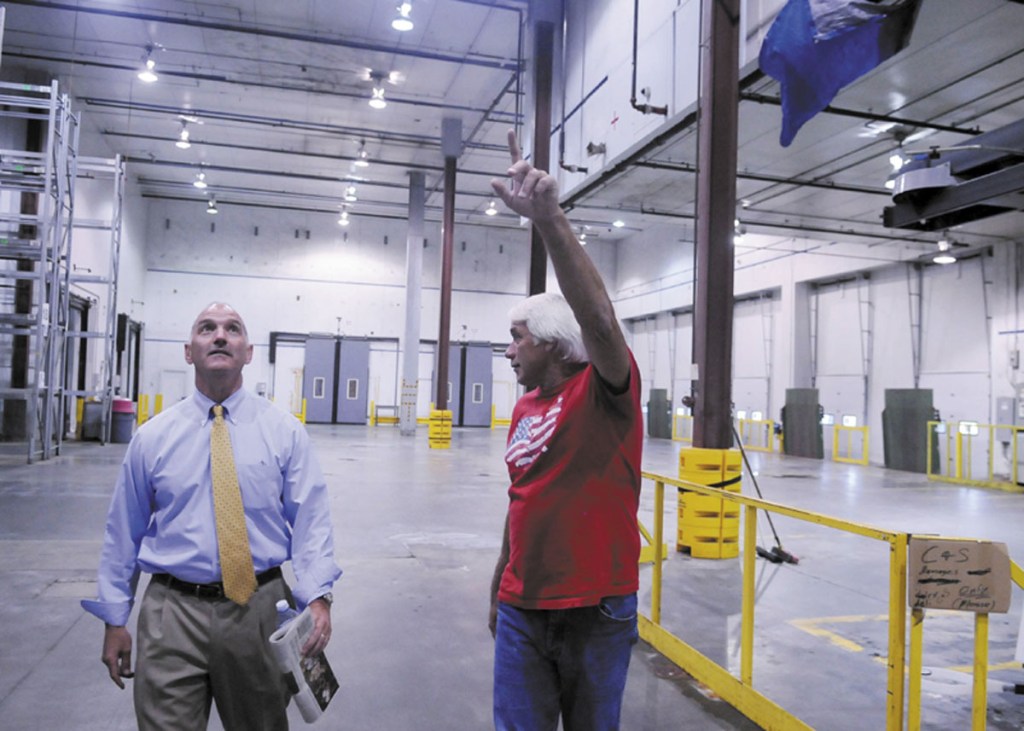GARDINER — Ownership of land and buildings belonging to Associated Grocers of Maine went to the bank that holds a $4.8 million mortgage on the property.
Stephen J. Matteo, senior vice president and corporate credit administrator at Camden National Corporation, parent company of Camden National Bank, submitted the successful $5 million bid Monday at public auction.
The sale of the 120-acre grounds, less than half a mile from Interstate 295, and its 263,000-square foot distribution warehouse and related buildings came in the wake of the shuttering of the grocery cooperative.
The auction was run by Keenan Auction Company of South Portland, and the property offered as one unit.
A handful of men paid $100,000 deposits to register as bidders, and more than a dozen former employees of Associated Grocers of Maine watched in the mostly quiet board room on the second floor of the office section of the distribution center warehouse.
Asked what the lender-now-owner will do with the property, Matteo said, “Sell it.”
It appeared that only three people responded to Stephan Keenan’s urgent plea to bid.
“This is an excellent opportunity,” he said. “Pennies a square foot for an excellent facility.”
The City of Gardiner assesses the property at more than $16 million. It includes a commercial subdivision with nine lots of various sizes.
Dick Condon of Chelsea may have a accidentally opened the bidding at $4 million when he inadvertently or strategically scratched his head.
Stewart Foster, an attorney who declined to identify those for whom he was bidding, raised to $4.25 million.
The auction was halted several times for 5 to 10 minutes each so the auctioneers could consult with Camden National Bank representatives. The bank had foreclosed on the property and set up the auction.
When bidding hit $5 million, Keenan said it was an absolute auction.
The former workers were looking for the bidding to go higher.
“I wanted it to be sold so we could get some pay,” said Jean Russell of Augusta. Most are collecting unemployment; a few have found other jobs.
Small groups of workers took a slow stroll through the building where they had spent 17 to 37 years.
The racks in the grocery side stood empty, and the coolers refrigerated a large, vacant room.
“It’s cheaper to keep it running,” said Floyd Duff of Pittston, who spent 30 years as a warehouseman, the last 15 in the cold section. Otherwise, he said, the ammonia would have to be drained from the system.
Tom Doucette of Windsor, maintenance worker, had scrawled a goodbye message on a white board: “It’s been a good 30 years.”
Associated Grocers of Maine was placed in court-ordered receivership in late April and at that point had accumulated at least $10.8 million in debt thanks to “irreversible, market-driven” losses on its way to court-ordered receivership.
Most of the debt was in the form of mortgages owed to two banks.
The cooperative owed $6 million to Savings Bank of Maine and the additional $4.8 million to Camden National Bank.
Court records show Camden National Bank has the first mortgage on the land and buildings and Savings Bank of Maine has a first mortgage on the items in the buildings.
The Finance Authority of Maine, a quasi-independent state agency, had guaranteed 20 percent of the $4.8 million loan Camden National Bank made to the Gardiner-based retailers’ cooperative last fall.
The court-appointed receiver, James C. Ebbert, posted a statement on Associated Grocers of Maine’s website, www.agofme.com, noting the company had suffered “irreversible, market-driven losses” in recent years.
In May, the receiver began liquidating the inventory and continues to ask the owners to render payment for the accounts receivable.
A number of Associated Grocers of Maine members — many of them operators of mom-and-pop grocery stores — have refused to make those payments, claiming they invested their money in the cooperative.
Several of them are now being sued for that money in court, and more than four dozen of them are being represented by attorney Joseph L. Goodman.
Earlier, Goodman said Associated Grocers of Maine continued to hold up to $50,000 for many of the grocers in a capital account, which served as a security deposit for credit so they could stock their shelves. The grocers also invested other money in accounts similar to savings accounts, he said.
“The majority of them are owed more money than they owe in accounts receivable,” Goodman said.
Associated Grocers of Maine had been in business since 1953, had 142 employees and supplied goods to more than 300 independent grocery stores statewide.
Those stores now are being provisioned by Pine State Trading, Associated Grocers of New England and other vendors.
The two banks also are involved in a lawsuit in Kennebec County Superior Court in which Camden National Bank balked at the receivership, claiming it was not notified.
Since then, various vendors have joined that lawsuit, and Goodman is seeking status for the retailers themselves.
Betty Adams — 621-5631
badams@centralmaine.com
Send questions/comments to the editors.




